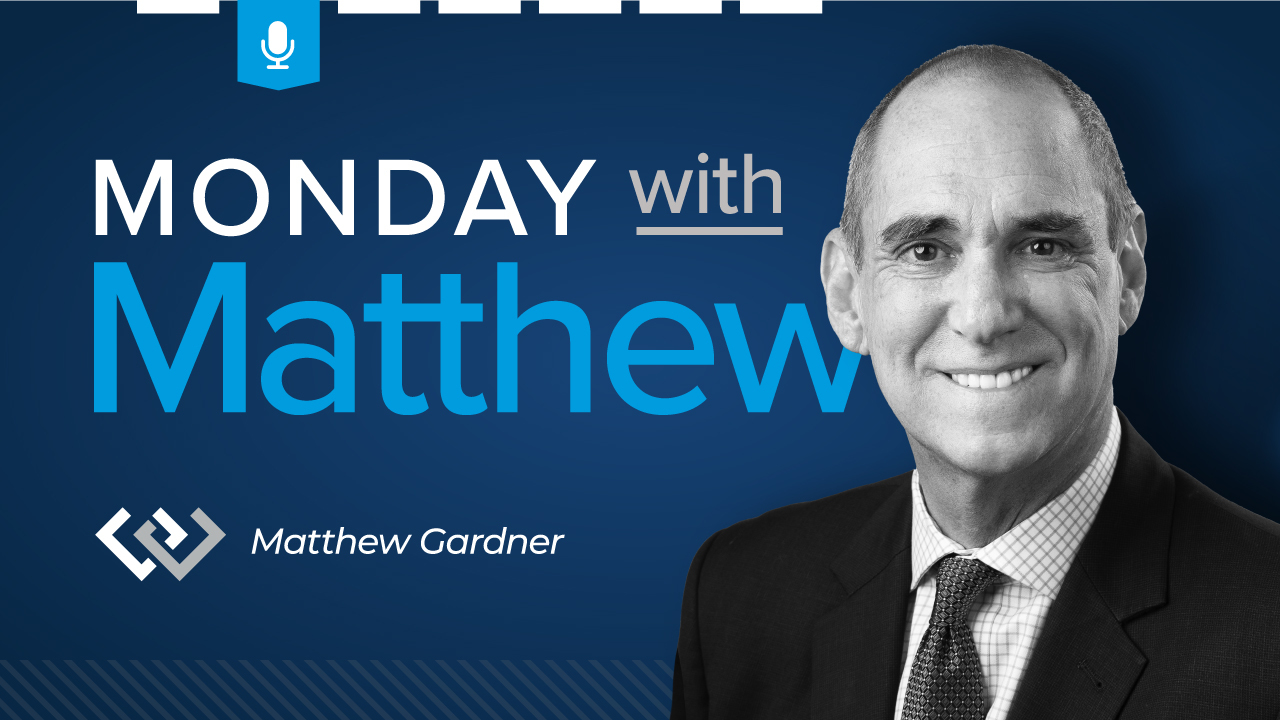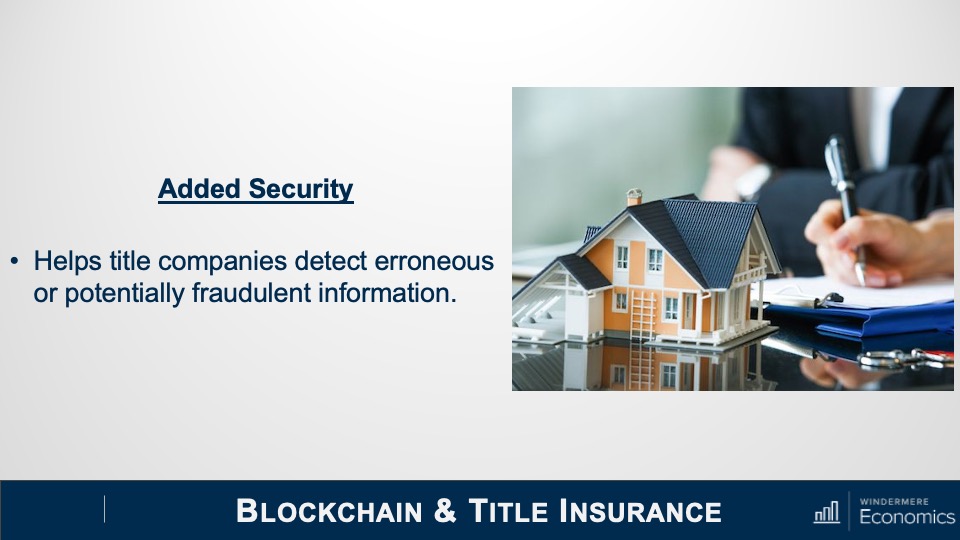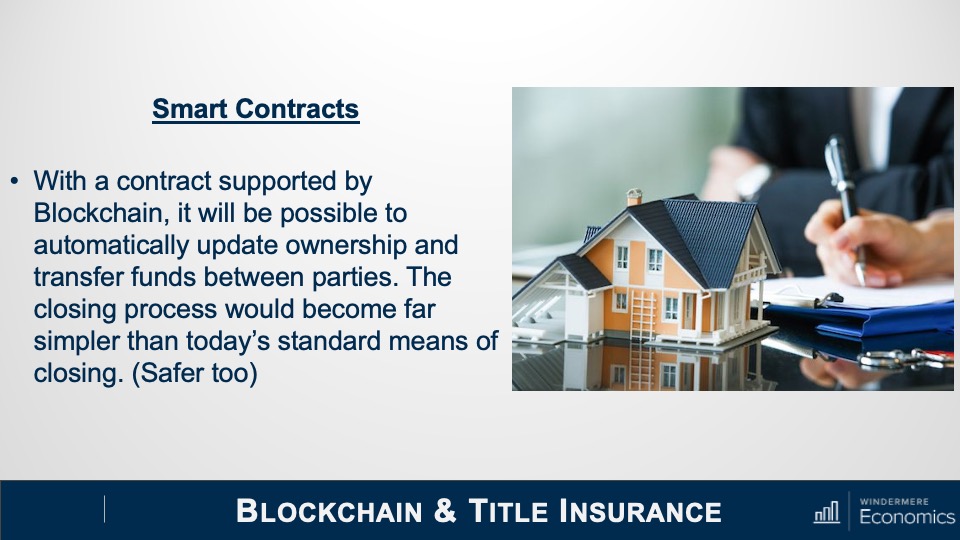Social Links Widget
Click here to edit the Social Media Links settings. This text will not be visible on the front end.
Blockchain Technology and Cryptocurrencies in Real Estate

This video is the latest in our Monday with Matthew series with Windermere Chief Economist Matthew Gardner. Each month, he analyzes the most up-to-date U.S. housing data to keep you well-informed about what’s going on in the real estate market. A big thank you to Matthew Gardner and the Windermere staff for getting updates like this out so we can stay informed.
Hello there, I’m Windermere Real Estate’s chief economist, Matthew Gardner, and welcome to the latest episode of Mondays with Matthew. This month we’re going to take a look at Blockchain technology and cryptocurrencies themselves and how both may impact home buyers and sellers in the future.
But before we dive into the potential impacts of cryptocurrency on the residential housing market, I must preface this by saying that the very word “crypto” is one that certainly divides people. Some see it as revolutionary, a tangible asset that will take over one day as the de-facto global currency, while others believe it to be unsustainable and ultimately valueless. And there are even some who firmly believe that it’s nothing more than a Ponzi scheme.
Now, everyone is certainly entitled to their opinion, and I will refrain from offering my own view on the currencies themselves, but, although still in its infancy, it continues to evolve and is garnering significant interest from individuals and large corporations alike.
Why are corporations interested, you ask? Well, a recent report from Crypto.com1 put the number of people around the globe who own some form of cryptocurrency at more than 295 million and they are forecasting this number to explode this year and hit the 1 billion mark! And the value of all these currencies today? As of March 14, the combined value of all cryptocurrencies was 1.74 trillion dollars2 with the largest, Bitcoin, valued at almost 740 billion dollars. So, it should not be a surprise to see many mainstream companies across multiple industry sectors start to introduce ways to accept crypto as payment for goods and services.
Companies moving into this space include AMC movie Theaters3 who recently announced their plan to accept coins by the end of this year. Fintech companies like Paypal and Square are also betting on crypto by allowing users to buy currency on their platforms. And, unsurprising to most, Tesla is also interested, but have yet to confirm whether they will accept coins as payment for their vehicles or not.
With cryptocurrencies now gaining traction in mainstream businesses, the housing sector has started to take an interest too with the emergence of companies like Propy, whose goal is to totally automate the home sales process by introducing Blockchain based technology to allow transactions to occur entirely online using smart contracts. Other companies are figuring out how to use blockchain technology to grow the “fractional-ownership” segment of the housing market.
But when it comes to simply buying a house—well that is an entirely different situation. Of course, a home buyer could easily cash out the Crypto they have and use those funds for a down payment, or even to buy a house outright. But we don’t see more of this today as they understand selling their currency is a taxable event and, more than likely, taxes owed will hit their balance sheets pretty hard. And knowing that this is a real issue in the market, it should come as no surprise that a company has come up with a plan to overcome what is seen as one of the biggest obstacles to using digital currency for home buying.
Blockchain Technology and Cryptocurrencies in Real Estate

And they are Milo, who claim to offer the world’s first “crypto-mortgage”. Essentially, they will allow borrowers to use Bitcoin—but only Bitcoin as of right now—as collateral for a 30-year mortgage.
How this works is pretty simple. All buyers have to do is to “pledge” their coins on a one-for-one basis. Simply put, someone looking for a $500,000 mortgage would have to put up $500,000 worth of Bitcoin. This way, they don’t actually have to sell their coins, so there are no tax implications. And instead of going through a FICO credit check and showing proof of income to evaluate a borrower’s creditworthiness, Milo evaluates them based on their crypto wealth as well as the value of the property they are hoping to buy.
And in exchange for locking up their crypto, borrowers get a 30-year mortgage for their home purchase can also make their mortgage payments via traditional currency or Bitcoin. But there are differences between this and a traditional mortgage. First off is the interest rate. It currently ranges anywhere from 5 to 8% depending on the loan-to-value ratio. This is higher than the rate they could get today.
And the interest rate is not fixed, but variable, and based on the prevailing price of Bitcoin. The rate can go up or down depending on the value of the Bitcoin they have pledged, and this mortgage rate will be adjusted every year. Interestingly, if the price of Bitcoin goes up, borrowers can actually take back some of their crypto once a year. If the price of Bitcoin goes down, they may be asked to provide more crypto as collateral.
And finally, when the buyer sells, on closing Milo is paid back in U.S. dollars, and then the seller gets the Bitcoins they used for collateral back, along with the profit made on the sale.
I think that this is certainly an interesting play in the ownership housing sector and, although still in its infancy, looks to meet the needs of crypto owners who don’t want to face the tax obligation that would occur if they were to sell their coins to buy a home. Now, I must make clear that Windermere is certainly not endorsing Milo. In fact, I personally have concerns about the program given how volatile cryptocurrencies are.
You see, it is possible that users may be caught out by the value of their Bitcoin dropping significantly and, if this occurs at or around their anniversary date, it could significantly raise the interest rate—and therefore the monthly payment—on that loan, and if the price drops too far, then they may have to go through what is, in essence, a margin call, where they will have to submit more funds to the lender to bring them back to a point where equity in the home combined with the value of the Bitcoin covers the loan itself.
And I would add that if for some reason the buyer has to sell the home within the first three years4 of purchase there are pre-payment penalties that will be incurred. All in all, it is an interesting model, but it is still in its infancy. As always, time will tell how well it gets adopted.
The bottom line for me is that the likelihood of Cryptocurrency revolutionizing the way we buy homes from a finance perspective is still several years away, but after that, who knows! Something that does have the capacity to be adopted into the mainstream far quicker is the blockchain technology itself. I personally see title insurance as a segment that could benefit significantly and may well adopt this tech sooner than others.
With title insurance companies responsible for verifying and ensuring that a buyer or lender (depending on the type of title insurance) gets either clean ownership or a lien position in the land in question, Blockchain could change many aspects of how these processes are carried out. Here are some of the benefits:
The Potential Benefits of Blockchain Technology in Real Estate

Security. More than 25 percent of title reports (alta.org) detail some form of defect to the title itself, but the ability of blockchain to immediately detect erroneous or potentially fraudulent information can significantly help to support the reliability of the records, therefore making the job of title insurance companies much more straightforward.

And then there’s smart contracts, which are actually a form of e-closing that is already beginning to be embraced by some in the industry. This technology makes the transfer of ownership almost seamless. Literally, it would take just a few clicks of a mouse. And this is also a massive benefit for the industry as the closing process would also change dramatically and become far more effortless and less time consuming than today’s standard means of closing on a home purchase.

And finally, record-keeping. While fraud and tampering are huge concerns for title companies, blockchain could all but eliminate these instances within ownership records. And, as it would convert land records to a distributed ledger, it cannot be altered within the blockchain itself, therefore making it safe in perpetuity. Blockchain, by design, prevents bad information from disrupting the chain and any attempt to tamper with it can be easily detected and therefore avoided. This is a massive upgrade from the county ledger that title insurance companies find themselves working with today.
No one can deny that Blockchain and cryptocurrencies, while still relatively new, do not appear to be just a flash in the pan. As we have discussed today, a number of companies continue to make inroads into the real estate world. Will some fail? Of course. But others will succeed. So, while still in its infancy, we should all have some sort of understanding of its potential to be a disruptor in the housing space in the future.
It’s my own personal belief that the Blockchain tech itself will be the thing that gets adopted by the real estate world faster than the rise of crypto as a way to buy or finance a home but, whatever your thoughts on this topic are, I think that it is highly unlikely that we will see it simply fade away over time.
As always, if you have any questions or comments about this particular topic, please do reach out to me but, in the meantime, stay safe out there and I look forward to visiting with you all again next month. Bye now.
References:
Matthew Gardner’s Top 10 Predictions for 2022

Matthew Gardner’s Top 10 Predictions for 2022
1. Prices will continue to rise
There are some who believe that U.S. home prices will drop in the coming year given last year’s extremely rapid pace of growth, but I disagree. I don’t expect prices to fall; however, the pace of appreciation will slow significantly, rising by around 6% in 2022 as compared to 16% in 2021 (nationally). As such, agents need to be prepared to explain this new reality to their clients who have become very accustomed to prices spiraling upward. Those days are likely behind us—and it’s not a bad thing!
2. Spring will be busier than expected
The work-from-home paradigm is here to stay for the foreseeable future, and this could lead to increased buyer demand. Many companies have postponed announcing their long-term work-from-home policies due to the shifting COVID-19 variants, but I believe they will soon off er more clarity to their employees. Once this happens, it will likely lead to a new pool of home buyers who want to move to more affordable markets that are further away from their workplaces. I also expect to see more buyers who are driven by the need for a home that is better equipped for long-term remote working.
3. The rise of the suburbs
For a large number of people whose employers will allow them to work from home on an ongoing basis, remote working will not be an all-or-nothing proposition. It will be a blend of working from home and the office. I believe this will lead some buyers to look for homes in areas that are relatively proximate to their office, such as the suburbs or other ex-urban markets, but away from high-density neighborhoods.
4. New construction jumps
I anticipate the cost of building homes to come down a bit this year as inflation finally starts to taper, and this should provide additional stimulus for homebuilders to start construction of more units. Material costs spiked in 2021 with lumber prices alone adding about $36,000 to the price of a new home. This year, I’m hopeful that the supply chain bottlenecks will be fixed, which should cause prices to moderate and result in a drop in building material costs.
5. Zoning issues will be addressed
I’m optimistic that discussions around zoning policies will continue to pick up steam this year. This is because many U.S. legislators now understand that one of the main ways to deal with housing affordability is to increase the supply of land for residential construction. Despite concerns that increased density will lower home values, I believe existing homeowners will actually see their homes rise in value faster because of these policies.
6. Climate change will impact where buyers live
Now that natural disasters are increasing in frequency and climate risk data is starting to become more readily available, get ready for home buyers to require information from their agents about these risks and their associated costs. Specifically, buyers will want to know about an area’s flood and fire risks and how they might impact their insurance costs and/or their mortgage rate.
7. Urban markets will bounce back
While increased working from home can, and will, raise housing demand in areas farther away from city centers, it may not necessarily mean less demand for living in cities. In fact, some urban neighborhoods that were once only convenient to a subset of commuters may now be considered highly desirable and accessible to a larger set of potential home buyers. At the same time, this could be a problem for some distressed urban neighborhoods where proximity to employment centers may have been their best asset.
8. A resurgence in foreign investors
Foreign buyers have been sitting on the sidelines since the pandemic began, but they started to look again when the travel ban was lifted in November 2021. Recently, the rise of the Omicron variant has halted their buying activity, but if our borders remain open, I fully expect foreign buyer demand to rise significantly in 2022. Keep in mind, foreign buyers were still buying homes sight unseen even when they were unable to enter the country, and this will likely still be the case if borders are closed again.
9. First-time buyers will be an even bigger factor in 2022
Once remote working policies are clearer, we should see increased demand by first-time buyers who currently rent. In 2022, 4.8 million millennials will turn 30, which is the median age of first-time buyers in the U.S. An additional 9.4 million will turn 28 or 29 in the coming year. I believe this group is likely to contemplate buying sooner than expected if they can continue working from home in some capacity. Doing so would allow them to buy in outlying markets where homes are more affordable.
10. Forbearance will come to an end
Forbearance was a well-thought-out program to keep people in their homes during the height of the pandemic. Some predicted this would lead to a wave of foreclosures that would hurt the housing market, but this has not been the case. In fact, there are now fewer than 900,000 U.S. homeowners in forbearance, down from its May 2020 peak of almost 4.8 million, and this number will continue to shrink. That said, there will likely be a moderate increase in foreclosure activity in 2022, but most homeowners in this situation will sell in order to meet their financial obligations rather than have their home repossessed.
Buying and Selling a Home at the Same Time

Does this sound like a daunting task? While there are lots of moving parts, it can be done and I am here to help. Thanks Sandy Dodge at Windermere for this insightful write-up.
Successfully selling a home and buying a home are significant accomplishments on their own, but when their timelines cross it can be difficult to manage both. If you’re thinking about doing both simultaneously, it’s equally important to understand the steps you can take to make the process go smoothly as it is to have a backup plan in case it doesn’t. Above all, the balancing act required to pull off both deals highlights the importance of working closely with a trusted and experienced real estate agent like myself.
Do I buy or sell first?
One can imagine a perfect world in which the two transactions go through one right after the other. However, this is not usually the case. So, should you list your current home first or start by putting in offers on a new one? There are pros and cons to both.
Selling your current home first allows you to make offers on a new home with cash in your pocket, increases your buying power, and avoids having to juggle two mortgages simultaneously. On the other hand, it creates a gap of residence, often leaving homeowners wondering where they’ll stay until they move into their new home or whether they may need to rent before they can buy again. Sellers may also negotiate a rent-back agreement with the buyers, allowing them to rent the house from the new owners before they move in.
Buying before selling solves the need for any temporary housing and makes the overall moving process much easier. Having a residence established ahead of time means you’ll only have to move once, which can save you some serious stress during this time of transition. Oppositely, buying a new home before you sell your current one will put an added strain on your finances. Having two concurrent mortgages equates to taking on more debt, which could result in less-than-favorable loan terms for purchasing your new home. Without the lump sum generated by a home sale in your pocket, coming up with enough money for a down payment may be a challenge and obtaining private mortgage insurance (PMI) may be in the cards. Finally, buying before selling comes with an obvious assumption—that your current house will sell.
Ultimately, the order of operations depends on your situation. Perhaps you’re moving due to a change of employment, and you need to direct all your energy toward buying a new home by a certain date before you can even think about selling your current one. No matter which route you take, it’s important to communicate your timeline to your listing agent or your buyer’s agent so they can strategize accordingly.
Buying and Selling a Home at the Same Time
Local Market Conditions
Buying and selling at the same time will come with a certain duality: at each step in the process, you’ll have to balance your responsibilities as both a buyer and a seller. For example, when assessing your local market conditions, you’ll be looking at not one, but two housing markets.
- Seller’s Market: Selling in a seller’s market means that that you’ll need to be prepared to move once you list, since you could be looking at a short selling timeline. However, relying too heavily on the assumption that your house will sell quickly could make things dicey down the road. If you’re buying in a seller’s market, finding a new home may take longer than expected. You could potentially be waiting weeks or months for an offer to get accepted.
- Buyer’s Market: Selling in a buyer’s market typically means that homes stay on the market longer. If you proceed with a new home purchase just after you’ve listed your current house, know that it may take a while to sell. If you’re buying in a buyer’s market you can afford to be picky, knowing that time is on your side. With fewer people buying homes, sellers will be more flexible, giving you leverage to negotiate your contingencies.
Having a Backup Plan
If only you could wave a magic wand and make both transactions go through as planned. That’s why it’s important to have a backup plan in place to right the ship should things go sideways at any point in the buying or selling process. Talk to your agent about which options may be right for you. Here are a few:
- Sales Contingency: Buying your new home with a sales contingency allows you to opt out of the purchase contract if your home doesn’t sell by a specified date. Purchasing contingent on the sale is rare in highly competitive markets.
- Bridge Loan: If your current home hasn’t sold yet and you’re not able to afford the down payment on a new home, a bridge loan may be a fitting solution. Bridge loans can be used to cover the down payment on a new house and are repaid once your existing home has sold.
- Rent-Back Agreement: A rent-back agreement is a clause in the sales contract that allows the seller to rent their old home from the buyer for an agreed-upon period of time before the buyer moves in. This can be especially helpful in situations when the seller is having trouble finding a new home.
I’d Buy Up a Couple Hundred Thousand
Warren Buffett, in a recent interview with CNBC, said he’d buy up a couple hundred thousand single family homes if it were practical to do so. They are a very attractive investment right now, he continues. He has a very positive outlook for the recovery and for the investment climate in America right now.
Buffett on the Economy
Aside from the housing sector, Buffett says the U.S. economic recovery is healthy and won’t be derailed by rising oil prices. He repeated what he’s been saying throughout the recession, that it’s always been a “terrible mistake” to be pessimistic on the U.S. over the long term.
This article among several other economic indicators should be an incentive to prospective home buyers that it’s a good bet to bet on real estate and if they are going to buy, get out and do so now.
In the Seattle area right now, we are experiencing a very strong market and a return to a seller’s market in many areas of Snohomish and King county. See maps from NWMLS just recently released.
Have Fun Out There–Buy a home!
 Facebook
Facebook
 Twitter
Twitter
 Pinterest
Pinterest
 Copy Link
Copy Link